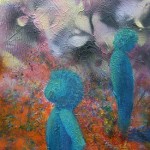Autism and personal space
 The term autism is highly politicised with some claiming their child as THE face of autism or desperately clinging to sinking stereotypes disappearing until the waves of diversity within the label itself. One of the face of that diversity is the aspect of personal space. Whether a child gets totally in people’s faces, or avoids them like the plague, it all gets called ‘the autism’. If you study personality, attachment disorders mood disorders, agnosias or the disorientation associated with gut, immune, metabolic disorders however, you’ll know there are many other reasons why any autistic child may display these issues and this further calls into question whether ‘autistic’ is, after all, just an adjective which became highly politicised. Added to this are recent findings that damage to the amygdala in the brain will result in inability to perceive the social responses which would normally have people back off out of other people’s face.
The term autism is highly politicised with some claiming their child as THE face of autism or desperately clinging to sinking stereotypes disappearing until the waves of diversity within the label itself. One of the face of that diversity is the aspect of personal space. Whether a child gets totally in people’s faces, or avoids them like the plague, it all gets called ‘the autism’. If you study personality, attachment disorders mood disorders, agnosias or the disorientation associated with gut, immune, metabolic disorders however, you’ll know there are many other reasons why any autistic child may display these issues and this further calls into question whether ‘autistic’ is, after all, just an adjective which became highly politicised. Added to this are recent findings that damage to the amygdala in the brain will result in inability to perceive the social responses which would normally have people back off out of other people’s face.
We know that in states of mania within Cyclothymia, people get exuberant, oblivious, uninhibited, impulsive and sociable. We know that in depression the opposite happens and people become socially avoidant, sometimes aggressive and the progressive loss of speech seen with Selective Mutism is common. And we know that mood disorders can occur from the age of 18 months and often go untreated in autistic children once the label ‘autism’ is used as it’s all then put down to ‘the autism’ (fait acompli). We know that children can be faceblind so people become interchangeable, all friend, or all foe, depending on the day, the mood, the personality. We know that inability to read facial expression and body language and intonation is called Social Emotional agnosia.  We know that inability to easily process more than one or two pieces of information at a time can be part of a neurological integration disorder such as Dyspraxia and can result in inability to simultaneously process sense of self and other. We know too that those with certain personality disorders will be more likely to tend toward Exposure Anxiety, social claustrophobia, social anxiety and social phobia and others will be highly motivated to be right in people’s faces with little regard for their needs. So perhaps its time we looked at personal space issues as more than a ‘social skills’ problem and help people to manage these issues on a more individualised basis that makes sense of the particular autism ‘fruit salads’ underlying their particular issues with personal space. We simply have to be more advanced, more creative, more humanitarian and less political than saying ‘oh that’s just the autism’.
Donna Williams, Dip Ed, BA Hons.
Author, artist, singer-songwriter, screenwriter.
Autism consultant and public speaker.
http://www.myspace.com/nobodynowherethefilm
http://www.donnawilliams.net
http://www.aspinauts.com

Thanks for this helpful insight, Donna. It really doesn’t make sense to “blame” everything a person does on the fact that they are autistic. I rant about this at work on a regular basis. Sigh. Anyway, thank you!
this is a brilliant, simple, and completely and utterly sensible piece of writing. thank you